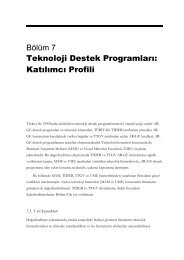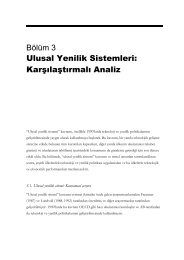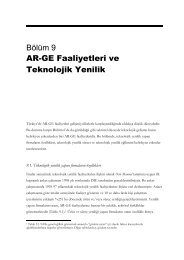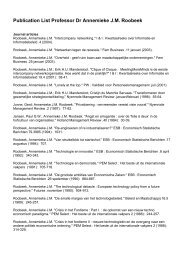The Australian Government's Innovation Report
The Australian Government's Innovation Report
The Australian Government's Innovation Report
Create successful ePaper yourself
Turn your PDF publications into a flip-book with our unique Google optimized e-Paper software.
Construction time and cost can also be significantly cut because of easier transporting and lifting of the prefabricated<br />
HySSIL panels. <strong>The</strong> panels are impact and fire resistant, and can be nailed and painted directly without<br />
rendering.<br />
<strong>The</strong> HySSIL technology has helped CSIRO partners enter the global construction industry and target the wall<br />
market, whose total value is estimated at US$125 billion a year.<br />
HySSIL wall panels are made using an energy-efficient process that does not require expensive and energyintensive<br />
curing equipment. Coupled with the added benefits of recyclability and improved thermal efficiencies,<br />
this technology can potentially reduce greenhouse impacts.<br />
Smart information use<br />
Harnessing technological aids: <strong>The</strong> Defence Science and Technology<br />
Organisation (DSTO) is exploring different aspects of the<br />
way in which information is used in the command and decision<br />
processes through the Livespaces project.<br />
<strong>The</strong> aim of this work is to harness technological aids for decisionmaking<br />
that are intuitive to use and reduce the cognitive effort<br />
required for human-machine and human-to-human interaction,<br />
thus enabling decision-makers to direct their efforts to the tasks<br />
at hand.<br />
<strong>The</strong> Livespaces project is bringing together a range of future command<br />
and control applications, ubiquitous computing technologies,<br />
telepresence systems, and new and innovative human interaction<br />
approaches in support of advanced teamwork activities. While<br />
the focus of the work is exploring the military application of these<br />
concepts, the work is also applicable to enabling increased collaborative<br />
interaction in the civilian context.<br />
Livespaces technology in use. Photo credits: DSTO<br />
Livespaces is one part of a cognitive and social informatics research programme. Cognitive informatics explores<br />
the application of information science and technology to enhance intelligence and computation processes in<br />
humans. Social informatics studies the design, uses and consequences of information technologies, taking into<br />
account their interaction with institutional and cultural contexts.<br />
<strong>The</strong> informatics research is drawing on and extending these discipline areas to enhance the abilities of both individuals<br />
and teams involved in sense and decision-making.<br />
Improving the quality of health and welfare statistics: Enhancing the quality of national statistics<br />
collections through innovative use of electronic data standard technologies has been a key priority for the<br />
<strong>Australian</strong> Institute of Health and Welfare during 2005-06.<br />
Data standards are crucial to data quality because they enable all those collecting, using and exchanging data<br />
to have the same understanding of it and its meaning.<br />
Historically data standards have been viewed in document form with relevant details manually entered into<br />
data systems, an inefficient and potentially erroneous process. In the interest of improving this process, the<br />
institute has enhanced its online registry of Australia’s health and welfare data standards (known as METeOR)<br />
to enable the electronic transmission of machine-readable data standards.<br />
This innovative development means that data systems across Australia can refer to the latest national data<br />
standard when collecting, validating, exchanging and presenting health and welfare statistics. Over time this<br />
will transform the way in which statistical collections are undertaken and boost data consistency and quality.<br />
Chapter 3 - National research priorities 109




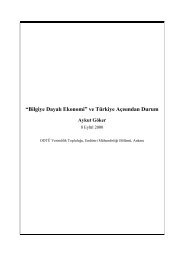
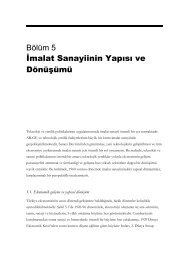
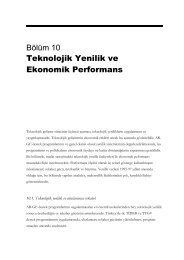

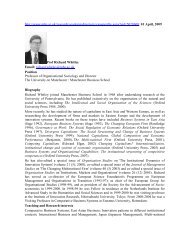

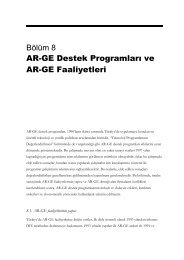
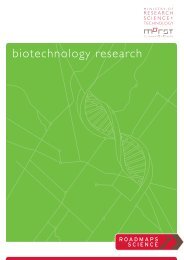
![[Tam] Uygula[ya] - Bilim, Teknoloji ve Ä°novasyon Politikaları TartıÅma ...](https://img.yumpu.com/36820041/1/184x260/tam-uygulaya-bilim-teknoloji-ve-anovasyon-politikalara-tartaama-.jpg?quality=85)
